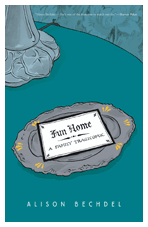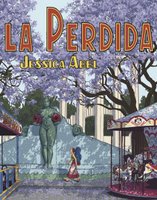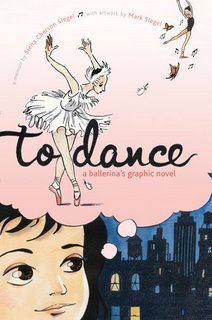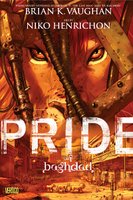Wow, has anyone else been trying desperately to get Blogger to function for the past three days!!? Sorry for the lapses between posts... good grief! I think this is all a plot to get us all to update our systems... well, I'm GETTING to it! At some point. Anyway... today's thought: I'm not dying for anything to do with Harry - my Potter of choice this month is
Beatrix! I hold out the idea of seeing the newly released movie as a little treat to force me through all of the necessary tasks of my week. That and the pile of books next to the bed are my carrot and stick this month.
Now that the Cybils voting has been over for a couple of weeks, I'm in novel recovery, reading wildly all over the place and selecting books that are only on my personal list, plus the inevitable "random handful" that I gather on my way out of the library toward the self-check machine. I've gone British with Diana Wynn Jones'
Chrestomanci series, enjoyed being introduced to Joyce Lee Wong's
Emily, and I also hope to sink my teeth into the rest of the
Middle Grade Cybils list as well as some standouts I've heard of like
That Girl Lucy Moon, or one of Ellen
Kushner's fabulous swashbuckling historical fictions for girls in her
Swordpoint series.Thanks to the many blogs and bloggers out there, I'm picking up things I'd never considered reading before, and I've found some surprises that still resonate with me these many weeks later. Though not all of these ended up on our
Cybil's shortlist, there are a couple of novels that I truly enjoyed that came with the theme of
"You Can't Tell Me What to Do!" These rebel yells were found in:
Koyal Dark, Mango Sweet. Ever heard the saying "
the darker the berry, the sweeter the juice?" It strikes me painfully that it's not only American persons of color but many other cultures who favor a European beauty ideal. In India where this story takes place, Jeeta is taught that she is too dark to be happy, too dark to be fortunate, too dark to marry well. And frankly, marriage is all that seems to be on the table for her future. This quiet novel could have been even more direct, but three cheers for the idea of not letting society have all the say about what is beautiful, who deserves to be happy, and how we should all behave.
Adora is a girl who struck out against what she perceived to be an unfair class system in her high school. Tired of being on the edges of the crowd, this
Fringe Girl stepped up to change things by using a class assignment. Of course, she wasn't totally successful, because when she started, she wasn't totally sure of what she wanted, or what to do once she got where she was going. I was a teensy bit disappointed that the novel didn't go deeper into the implications of class and social structures, but I have great hopes for another novel-in-process called
Latte Rebellion, which is also about a social movement gone wildly awry which involves race... and coffee.
Don knows that you can put up with anything if you have a goal. Even the thug beating him up during PE is something he can just sort of ignore, because he's got a goal -- something more real to him that school, friends, and the people around him, including his mother, the
Half Alien to be, and his
Stepfacist. (And wouldn't that be a great group: Half-Alien & the Stepfacists?)
The Astonishing Adventures of Fanboy and Goth Girl was one of my favorite novels because it is a bright and shining reminder that there's life beyond high school -- and that nobody can box you into their narrow idea of who you are unless you let them.
I read this book and was thrown back into a time when being disabled meant that you were treated like you were completely a non-person.
Accidents of Nature was an eye-opener. I was riveted by both of the main characters. Jean believes that she is just as mainstream as everyone else, and acts that way, while Sara sort of rebelliously
revels in her other-ness, and forces others to not only see her as inseparable from her disease, but to accept her as she is. This novel was tough to read at times, as the young adults with full physical abilities at times seemed
criminally stupid or unfeeling, and I wondered if this was just a bitterness of the character, or a reality in the 70's. The ending is fairly enigmatic, but this is a novel that sticks with you for a long time.
I was never much of a prairie novel fan, but
Hattie Big Sky won me over because Hattie just has so much heart. Nobody thought she could do anything more than be somebody's wife or somebody's maid, and in the end, what she chose to do was, in fact, too hard for her (although in real life it wasn't... and I'm still not sure why the author chose to have her fail. I know it's more realistic, and most people
DID fail, but Hattie didn't...? Anyway...), but she still gave it her everything, in her own quiet, rebellious way. Beautiful.
Sneaking out to audition for
Oye Mi Canto isn't the most rebellious thing Ali does. She concentrates on being herself -- which is the gutsiest thing of all.
Adios to My Old Life was full of twists and turns of show-biz, and really enjoyable. Though things didn't go the way Ali thought that they would, she still came away with success. One thing I liked was that success wasn't narrowly defined. Other contestants in the show lived life in different ways -- some loved adulation, some loved flirting and jewelry, etc., but there was no defining "this is the only way to do it" type of rhetoric. I loved that the Latino people were portrayed as
intelligent and educated and as varied as peoples of all nations actually are. It's actually vanishingly rare to see Latin peoples portrayed that positively, and I hope this book attracts all of the readers it deserves.
To round out my Super Seven, I chose
Nothing But the Truth and a Few White Lies, which I had the privilege of reading before it was nominated. Despite its deceptively
pink cover, this is a riot grrrrl book, and Patty Ho is kind of queen of the rebels, as she first rebels against every stereotype placed on her by both her Asian and non-Asian acquaintances, and then she escapes from the narrow role she's defined for herself. She's not an Egg, a Banana, or any other
schizophrenic snack-oriented racial category. She is just herself: and that has to be good enough. This novel's gift is that it transcends race, hapa-ness, and other categories to appeal to
anybody and everybody who hasn't fit well into the categories other people have carved out for them. This novel gives readers the gift of knowing it's okay to fight to be oneself.
Others have shared the fun and frustrations of being on the Cybils panel with so many great books and so few to choose. Check out what
Little Willow and
Mindy have to say about their favorite Cybil picks which did or didn't get onto our shortlist.
Meanwhile, is anyone else still
thinking about resolutions...? The longer I delay writing them down, the longer I don't have to do them, right? ... Oh,
okay. I'll get to them. Soon.

 (Of course, like
(Of course, like  That's always a disconcerting discovery, no? Lo, these many years of flinging off my breezy (and thoroughly indecipherable) signature, now I find it takes... thought. I was squinting over the swoops, and studying the loops.
That's always a disconcerting discovery, no? Lo, these many years of flinging off my breezy (and thoroughly indecipherable) signature, now I find it takes... thought. I was squinting over the swoops, and studying the loops. BOOK TO READ to make all the evil of boxes and moving vans and unpacked linen closets GO AWAY for just awhile...!
BOOK TO READ to make all the evil of boxes and moving vans and unpacked linen closets GO AWAY for just awhile...!
 incident with the bus and a screwdriver got all blown out of proportion -- in front of everybody -- and things just got worse when Kyle was accidentally placed in accelerated classes, and lost all of his friends. Kyle just wants to make it through school without anyone looking at him, but his mother -- a counselor -- feels like there's more to life than just waiting for the sky to fall. She very annoyingly requests that he reads Happy Kid: A Young Person's Guide to Satisfying Relationships and a Happy and Meaning-filled Life, claiming the book just screamed his name when she saw it -- in a discount store. Only when she offers to pay him does Kyle break down and decide to read the book. But the book has ideas of its own... it won't let him read forward until he follows its advice. And the book's advice lands Kyle in some situations that only grow worse.
incident with the bus and a screwdriver got all blown out of proportion -- in front of everybody -- and things just got worse when Kyle was accidentally placed in accelerated classes, and lost all of his friends. Kyle just wants to make it through school without anyone looking at him, but his mother -- a counselor -- feels like there's more to life than just waiting for the sky to fall. She very annoyingly requests that he reads Happy Kid: A Young Person's Guide to Satisfying Relationships and a Happy and Meaning-filled Life, claiming the book just screamed his name when she saw it -- in a discount store. Only when she offers to pay him does Kyle break down and decide to read the book. But the book has ideas of its own... it won't let him read forward until he follows its advice. And the book's advice lands Kyle in some situations that only grow worse. her best friend, Allison Concord, who is a crazy, funny person who sometimes freaks out a bit and comes on too strong. Jane would do anything to protect Ally, and she does, even flagrantly breaking a silly school rule to get people to stop staring at Ally the day she throws up all over a freshman girl. Jane is always in Ally's corner, until one day it seems that Ally doesn't need her. She's got everything -- good posture, good hair, good clothes and a new friend in her "Little;" the freshman who has chosen her to be her Big -- her Senior buddy. Why does she need prickly, cranky Jane - who didn't even score her own Little -- anymore?
her best friend, Allison Concord, who is a crazy, funny person who sometimes freaks out a bit and comes on too strong. Jane would do anything to protect Ally, and she does, even flagrantly breaking a silly school rule to get people to stop staring at Ally the day she throws up all over a freshman girl. Jane is always in Ally's corner, until one day it seems that Ally doesn't need her. She's got everything -- good posture, good hair, good clothes and a new friend in her "Little;" the freshman who has chosen her to be her Big -- her Senior buddy. Why does she need prickly, cranky Jane - who didn't even score her own Little -- anymore?

 Thanks to sharp-eyed
Thanks to sharp-eyed 
 Since I tend to find my books in smaller bookstores (and usually head straight for whatever I'm looking for), the display copies are sort of ...well, invisible to me. (As I say this I realize I'm a bookseller's worst nightmare - a focused shopper. Aaargh!) The books I actually notice displayed for YA readers have a definite... well, slant to them. They're either in candy (or is it CUPCAKE or POPSICLE) shades, like the ubiquitous "chick lit" and they look like they're all written for girls.
Since I tend to find my books in smaller bookstores (and usually head straight for whatever I'm looking for), the display copies are sort of ...well, invisible to me. (As I say this I realize I'm a bookseller's worst nightmare - a focused shopper. Aaargh!) The books I actually notice displayed for YA readers have a definite... well, slant to them. They're either in candy (or is it CUPCAKE or POPSICLE) shades, like the ubiquitous "chick lit" and they look like they're all written for girls. sometimes, why... Good books like Nothing But the Truth (and a few white lies) or An Abundance of Katherines are likely overlooked because of their covers. I absolutely love the cover Gail Gautier's
sometimes, why... Good books like Nothing But the Truth (and a few white lies) or An Abundance of Katherines are likely overlooked because of their covers. I absolutely love the cover Gail Gautier's  aggravating it is for authors to deal with the novel cover selection process. One of my MFA profs said told that we as newly fledged authors would have no say in how our covers appeared, for at least our first several novels.
aggravating it is for authors to deal with the novel cover selection process. One of my MFA profs said told that we as newly fledged authors would have no say in how our covers appeared, for at least our first several novels.  He had at that point three in print, and only had gotten his say because he'd a.) taken a business course and b.) presented his professional opinion after begging to sit in on a publication meeting. They listened to him, he said, because he'd gone the extra mile to prepare something. And to humor him. YA/Children's Lit might be different. Here's hoping... If they're open to it, when I am famous, I'm going to bug
He had at that point three in print, and only had gotten his say because he'd a.) taken a business course and b.) presented his professional opinion after begging to sit in on a publication meeting. They listened to him, he said, because he'd gone the extra mile to prepare something. And to humor him. YA/Children's Lit might be different. Here's hoping... If they're open to it, when I am famous, I'm going to bug 





